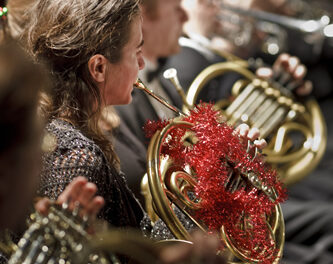The Moore County Arts Council has successfully taken over the management of the Classical Concert Series. Its reputation for an outstanding mix of the best of established and rising chamber music talent assures the intimate Sunrise Theater (seats 367) sells out on subscriptions. Returned tickets take care of those on the waiting list. The well-established Mendelssohn String Quartet is familiar to both Triad and Triangle music lovers from a residency at the North Carolina School of the Arts or the memorable finale of the Raleigh Chamber Music Guild. They presented a substantial program of early Beethoven and Bartók and late Mendelssohn.
Beethoven’s Quartet in C minor, Op. 18/4 is the only minor key work in the six works in Opus 18 and is believed to have been the last composed. Dramatic tension is especially heightened throughout helping to make it the most popular quartet in the set. The high quality of the Mendelssohn Quartet’s players was immediately evident in the beautiful, rich blending of their instrumental tone during the dark-hued and throbbing first theme. The violin sound of noted virtuoso Miriam Fried and second stand, Nicolas Mann (son of Juilliard String Quartet founder, Robert Mann) was especially closely matched. Founding cellist Marcy Rosen and newest violist Daniel Panner produced a full and sumptuous tone. Intonation was impeccable throughout the entire concert. The polyphony of the witty second movement Scherzo was very clear as the tunes were tossed from instrument to instrument in what Melvin Berger, in Guide to Chamber Music, calls “a profusion of canons and fugati.” A highlight of the middle of the third movement Menuetto was the dialogue between Mann and Panner underpinned by Rosen’s cello bass line and Fried’s “running triplet commentary.” The hint of so-called Turkish music in the bright main theme of the finale was just one of the work’s plethoras of delights.
The Mendelssohn String Quartet’s interpretation of Béla Bartók’s Second String Quartet, Op. 17, Sz. 67 (1917) was outstanding in every way. The first movement is about as lyrical and melodious as Bartók ever gets. The composer’s folk music studies in Hungary or North Africa are sublimated in the energetic and fierce middle movement. Long stretches of repeated notes suggest drums or a bagpipe-like drone. The ensemble’s weaving of the reflective and somber last movement drew the listener into a timeless world that culminated with two mystical pizzicato notes on the viola and cello.
The musicians chose a mature work of the quartet’s namesake, Felix Mendelssohn (1809-1847) to end the concert. Quartet in E-flat, Op. 44/3 was actually composed second of the three pieces in the set. The first movement is dramatic and opulent, while the second movement is typical of a composer who could probably write a scherzo in his sleep! It begins fleet and light, develops a little fugato for the viola in the middle, and returns to the gossamer texture of the opening. The first movement is recalled in the slow movement which also features some lovely arpeggios. The finale is bravura with its fast pace and surging energy. The Mendelssohn String Quartet played with a refined palette of string color and dynamics, clean, clear articulation of the fastest passages, and insightful and stylish phrasing. This was a satisfying evening filled with the musicians’ long-experienced and perceptive music making.
The 2008-2009 Classical Concert Series’s Season will be announced at the last concert on March 17. Director Chris Dunn only hinted at a former Van Cliburn Competition winner and several chamber music prize winners.











